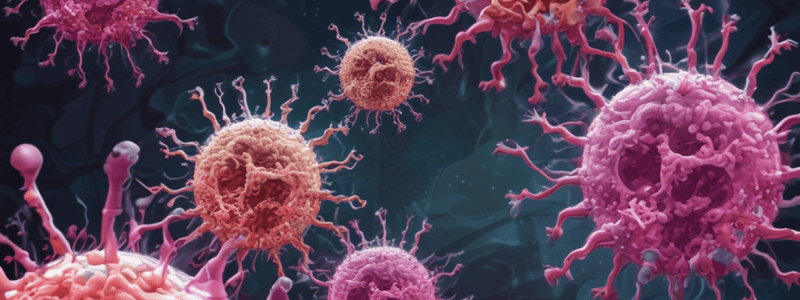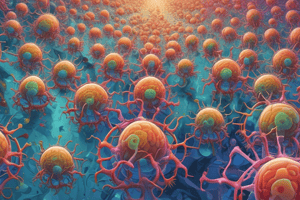Podcast
Questions and Answers
Match the following stages of virus replication with their corresponding descriptions:
Match the following stages of virus replication with their corresponding descriptions:
Penetration = The process of the viral genome entering the host cell Uncoating = The release of the viral genome from its protein coat Assembly = The formation of new viral particles Release = The exit of new viral particles from the host cell
Match the following stages of membrane penetration effect with their corresponding descriptions:
Match the following stages of membrane penetration effect with their corresponding descriptions:
Endocytosis = Taken up into endosome Trafficking of nucleocapsid/virus particle/DNA strand = into the nucleus Attachment = Binding of viral attachment protein to receptor protein on host cell membrane Fusion of membranes/lysis of endosome = Acidification of endosome leads to conformational shift in HA
Match the following
Match the following
Genome replication = @ NUCLEUS Transcription = production of mRNA from DNA @ NUCLEUS Translation = Production of viral structural proteins and non-structural proteins from mRNA at CYTOPLASM Assembly of new virus particles = @CYTOPLASM
Match the following stages of virus replication with the correct order in the replication process:
Match the following stages of virus replication with the correct order in the replication process:
Match the following viruses with the correct method of release from infected cells:
Match the following viruses with the correct method of release from infected cells:
Match the following viruses with the corresponding receptor
Match the following viruses with the corresponding receptor
Attachment is the first interaction between host and virus, thus is the only determinant of tropism
Attachment is the first interaction between host and virus, thus is the only determinant of tropism
The cell membrane is a major barrier to virus entry
The cell membrane is a major barrier to virus entry
Ribosome of host cell is involved in viral replication
Ribosome of host cell is involved in viral replication
mRNA translates into 1 long protein, which will be cleaved into smaller units or remain intact to form new viral proteins.
mRNA translates into 1 long protein, which will be cleaved into smaller units or remain intact to form new viral proteins.
All DNA viruses replicate in the nucleus and all RNA viruses replicate in the cytoplasm.
All DNA viruses replicate in the nucleus and all RNA viruses replicate in the cytoplasm.
Which of the following is not a site envelope viruses exits via budding
Which of the following is not a site envelope viruses exits via budding
Enveloped viruses must carry lipid producing enzyme to form the envelope
Enveloped viruses must carry lipid producing enzyme to form the envelope
Naked virus can only exit through lytic egress/lysis.
Naked virus can only exit through lytic egress/lysis.
Flashcards are hidden until you start studying
Study Notes
Virus Replication
- Acidification of the endosome triggers a conformational change in the virus proteins, allowing them to escape the endosome through fusion or lysis.
- The replication of viruses involves the following stages: attachment, penetration, uncoating, transcription, translation, genome replication, assembly, and release.
Stages of Virus Replication
- Attachment: The virus attaches to specific receptors on the surface of the host cell.
- Penetration: The virus enters the host cell through fusion or endocytosis.
- Uncoating: The viral genome is released from the protein capsid.
- Transcription: The viral genome is transcribed into mRNA.
- Translation: The mRNA is translated into viral proteins.
- Genome replication: The viral genome is replicated.
- Assembly: New virus particles are assembled.
- Release: The new virus particles are released from the host cell through lysis or budding.
Characteristics of Viruses
- Viruses are not considered living cells because they require a host cell to replicate.
- Viruses are composed of a protein shell (capsid) and a genome (RNA or DNA).
- Viruses can be enveloped or non-enveloped.
- Enveloped viruses exit the host cell through budding, while non-enveloped viruses exit through lysis.
Effects of Virus Infection on Host Cells
- Virus infection can have severe consequences for cells grown in culture, including cell lysis, rounding and detachment, formation of giant multi-nucleated cells (syncytia), and programmed cell death (apoptosis).
Studying That Suits You
Use AI to generate personalized quizzes and flashcards to suit your learning preferences.




